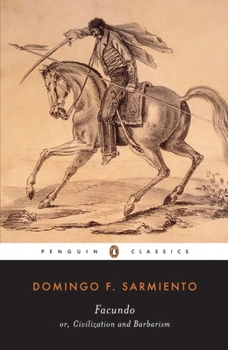Facundo: Or, Civilization and Barbarism
(Part of the Latin American Literature and Culture Series)
Select Format
Select Condition 
Book Overview
Ostensibly a biography of the gaucho barbarian Juan Facundo Quiroga, Facundo is also a complex, passionate work of history, sociology, and political commentary, and Latin America's most important essay of the nineteenth century. It is a study of the Argentine character, a prescription for the modernization of Latin America, and a protest against the tyranny of the government of Juan Manuel de Rosas (1835-1852). The book brings nineteenth-century Latin American history to life even as it raises questions still being debated today--questions regarding the "civilized" city versus the "barbaric" countryside, the treatment of indigenous and African populations, and the classically liberal plan of modernization. Facundo's celebrated and frequently anthologized portraits of Quiroga and other colorful characters give readers an exhilarating sense of Argentine culture in the making. For more than seventy years, Penguin has been the leading publisher of classic literature in the English-speaking world. With more than 1,700 titles, Penguin Classics represents a global bookshelf of the best works throughout history and across genres and disciplines. Readers trust the series to provide authoritative texts enhanced by introductions and notes by distinguished scholars and contemporary authors, as well as up-to-date translations by award-winning translators.
Format:Paperback
Language:English
ISBN:0140436774
ISBN13:9780140436778
Release Date:October 1998
Publisher:Penguin Publishing Group
Length:288 Pages
Weight:0.60 lbs.
Dimensions:0.5" x 5.2" x 7.7"
Age Range:18 years and up
Grade Range:Postsecondary and higher
Customer Reviews
2 ratings
one classic argentine's book
Published by Thriftbooks.com User , 24 years ago
It's difficult to classify "Facundo" written by Domingo Faustino Sarmiento (argentine thinker, politician and educator) in 1845: it is at the same time history, myth, essay, pamphelt and sociological discourse. It was published for first time as a newspaper serial in Chile where Sarmiento was in exile and written against Rosas'dictatorchip in Argentina. The text is influenced by the Enlightment and specially by the romanticism. Because of the romantic influence, it tells Facundo Quiroga's biography since for romantic'stream a "great man" (Facundo in this case) expresses an epoch. This book has the intention of solving an enigma: how independence's revolution in Argentina (1810) reached Rosas ' dictactorship (1835-1852) This drama, product of the revolution, was caused by the combination of 2 elements which shouldn't have been combined: the city, civilization's field, and the countryside, barbarism's field. The book can be read as the city and the countryside were the characters.
An ahead-of-its-time (1830s) analysis of oppression.
Published by Thriftbooks.com User , 28 years ago
Sarmiento analizes in this book the oppressive political regime that Juan Manuel de Rosas impossed over the Province of Buenos Aires during the first years of the independent-from-Spanish-rule Argentine Republic (then Confederation). He writes this book in his Chilean exile and publishes it by means of short articles in a prestigous Chilean newspaper during the 1830s and 1840s. In this book, a classic of early Latin American History and Literature, Sarmiento *deconstructs*, to abuse of modern terminology, the life and works of Facundo Quiroga, a tyrant of the inland provinces of Argentina, so that we can better understand the true extent, the true abomination being carried out by the other despot, Rosas, in a Buenos Aires proud of its European heritage. Sarmiento describes the way of life -highly influenced by late Spanish colonial tradition- and the almost unreal landscape of the Argentine Pampas (plains). In that landscape and traditions is born Quiroga, the wild gaucho who is to terrify its own people when he becomes an adult. Sarmiento analizes the society's pathologies that make possible for Quiroga to become the head of a tyrannical regime. His method to approach Rosas via Quiroga is, I believe, very effective. Now it is easier to understand how Rosas regime can become a reality on New World soil just a decade after Independence. Rosas, born in a rich family of *hacendados* with strong Spanish tradition and with landholdings close to Buenos Aires of the 1820s, shares with Quiroga an explosive combination of hate for anything that reminds him of his incivility with an appeal that the isolated people of the Pampas can not resist, the appeal of a man who is the best horse-rider, the best knife-fighter and the best friend of the gaucho. Nothing reminds Rosas more of his rudeness than nearby booming Buenos Aires. The rest of the book lists the atrocities, offensive to any civilized person, commited by Rosas once he gains by mean of terrorist practice the *sum of power* over the city; Sarmiento also discusses what freedom means for a society and for the individuals. Summarizing, this book, which paved the way to a more democratic Argentina, is an example of the power of words to fight oppression, and a *manual* to detect before-it-is-too-late the dangers that keep assaulting democratic life in any society at any time.






